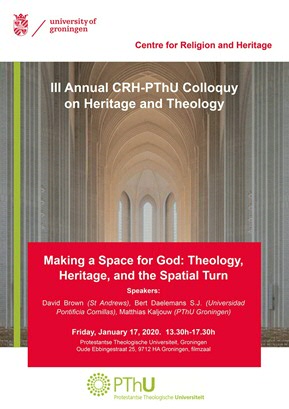Making a Space for God: Theology, Heritage, and the Spatial Turn
Making Space for God asks where theology and heritage meet in spaces, and the ways people create, adapt, represent, and imagine them. The Dutch Ministry of Education, Culture, and Science has allocated 13,5 million euros for the development of community-based Kerkenvisies that take on the challenges and opportunities posed by religious heritage buildings at the local level. But what actually is a religious space? Can God still be encountered through old architectural forms? How can a new architectural form introduce people into a mystery? What tension lies between sacred spaces and commercial use in contemporary (re)developments?
The three speakers will approach the intersection of spatial approaches to religion, theology, and heritage from three engaging perspectives. Following each speaker will discussion time, and at the conclusion a roundtable.
The Colloquy, is part of series of colloquies jointly hosted by the Faculty of Theology and Religious Studies of the University of Groningen, and the Protestant Theological University's campus in Groningen, which explores the intersection of heritage and Christian theology.
III Annual CRH-PThU Colloquy on Theology and Heritage
Timetable
- 13.00-13.30 Inloop (doors open)
- 13.30-13.40 Introduction (Kirn)
- 13.40-13.50 Introduction of speakers (Van Dijk)
- 13.50-14.20 Lecture 1: Prof. David Brown
- 14.20-14.30 Discussion 1
- 14.30-15.00 Lecture 2: Dr. Bert Daelemans
- 15.00-15.10 Discussion 2
- 15.10-15.30 Coffee Break
- 15.30-16.00 Research Report: Matthias Kaljouw
- 16.00-16.10 Discussion
- 16.10-16.30 Round Table (Irving)
- 16.30-16.45 Close (Kirn) and thank-you (Van Dijk)
Speakers
-
Can God still be found through Gothic? The Literary Contribution
Prof. David Brown, School of Divinity, University of St Andrews
Gothic is in many countries the most common architectural style but also the most contested, the very name being a term of abuse invented at the Renaissance. In this paper I want to explore how novelists and poets have treated the theme in England and France over the past couple of centuries: first in its return to popularity (Hugo, Huysman); then in its continued critique (Hill, Rilke, Wharton); and , finally, in its more subtle defence in William Golding. If there is time, I would also like to draw a parallel with Jesus’ experience of the Temple: positive religious experience still able to emerge despite negative currents the other way. -
Mystagogical Space: How a Liturgical Place Can Introduce Us into the Mystery
Dr. Bert Daelemans, S.J., Facultad de Facultad de Teología, Departamento de Teología Dogmática y Fundamental, Universidad Pontificia Comillas (Madrid).
Entering a church is entering a mystery. Which essential features of contemporary church architecture make this happen? By (re)visiting some recent case studies, we collect some clues that hold the key to the revelation of the mystery. We will discover that much, if not everything, has to do with the way people use and inhabit their buildings. -
'But you have made it a den of robbers!': On the entanglement of God and commerce in monumental city churches
Mr. Matthias Kaljouw, PhD Candidate, Protestantse Theologische Universiteit (Groningen).
The background of the presentation will be the project Kaljouw is working on with five participating churches. The project focuses on the renting practice within their buildings, and provides a interesting concrete example of 'contestation' or 'contested spaces'. Kaljouw writes: I will give a work report on how you can operationalize the huge amount of concepts within the field of socio-spatial research (that would also give space for some criticism ). Then I will apply this to the theme of commercial church use, and the entanglements of local churches and commercial church lease for events.

